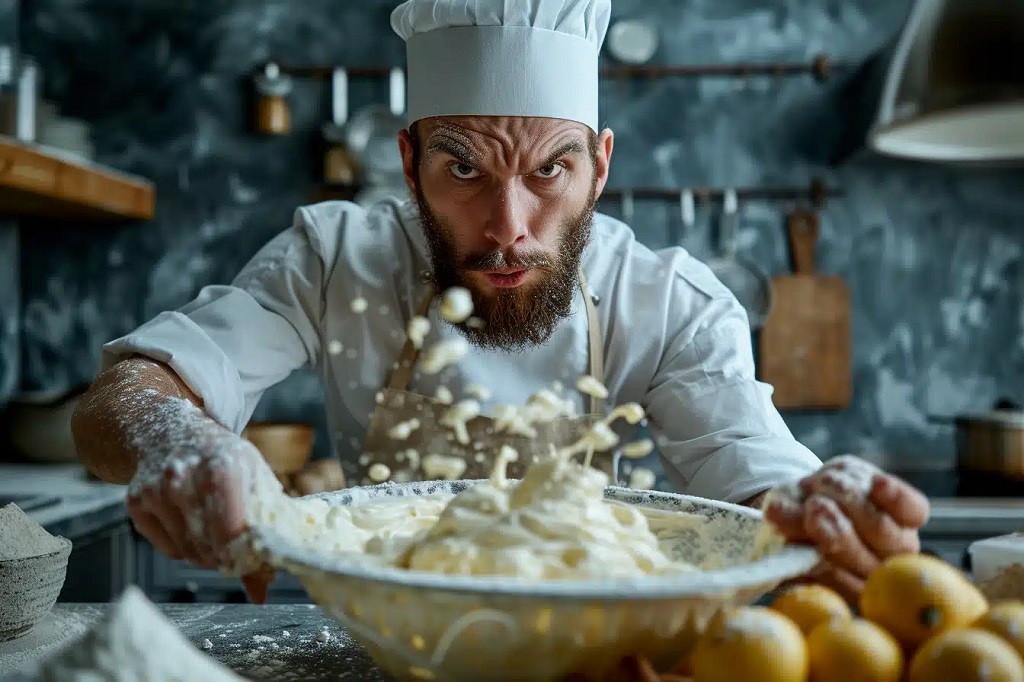We’ve all been there. You’re meticulously following a recipe, feeling confident in your culinary skills, when – BAM! A burnt cake, a curdled sauce, or an overflowing pot throws your kitchen into disarray. Fear not, fellow food enthusiasts! Cooking mishaps are a natural part of the learning process. The key is not to get discouraged but to approach these moments with a sense of humor and a recovery plan.
This article empowers you to transform kitchen mishaps from frustrating setbacks into valuable learning experiences. We’ll explore common cooking mistakes, equip you with salvaging techniques, and offer tips to prevent future disasters, all while fostering a more relaxed and enjoyable cooking experience.
Owning the Oops: Identifying Common Cooking Mishaps
Understanding what went wrong is the first step to fixing it. Here are some frequent kitchen blunders:
- Overcooking: We’ve all forgotten something simmering on the stove. Overcooked meat can become dry and tough, while vegetables lose their vibrant color and texture.
- Undercooking: This can be a safety concern with meat and poultry. The undercooked dough might not rise properly or bake through completely.
- Burning: A momentary distraction can lead to burnt toast, a scorched pan, or worse – a ruined dish.
- Salting Mishaps: Adding too much salt can render a dish inedible.
- Curdled Sauces: This often happens when dairy is added too quickly to a hot pan or when whisking isn’t thorough enough.
- Baking Fails: A flat cake, a sunken souffle, or a dense loaf of bread can be disheartening. These mishaps might stem from incorrect measuring, poor oven temperature control, or improper mixing techniques.
The Art of Recovery: Turning Mishaps into Meals
Even the most seasoned chefs encounter kitchen mishaps. The good news is that many mistakes can be salvaged with a little ingenuity:
- Overcooked Meat: While you can’t bring back lost moisture, you can disguise dryness by shredding the meat and using it in a stew, soup, or enchiladas.
- Undercooked Meat: Safety First! Discard undercooked meat and start over.
- Burnt Food: Assess the damage. For minor scorching, scrape off the burnt bits and continue cooking. For heavily burnt pots or pans, immediate soaking can help loosen burnt-on food particles.
- Overly Salty Dishes: There are several ways to mitigate saltiness. Add a squeeze of lemon juice or a splash of vinegar, as their acidity can counteract the saltiness. Adding diced potatoes or cooked rice can also help absorb excess salt.
- Curdled Sauce: Don’t despair! Remove the pan from the heat and whisk in a tablespoon of cold butter or a slurry of cornstarch and water.
- Baking Fails: For a flat cake, consider turning it into a delicious trifle or a layered dessert with whipped cream and fruit. A sunken souffle might be salvageable by incorporating it into a creamy sauce. A dense loaf of bread can be repurposed into bread pudding or breadcrumbs.
Beyond Recovery: Building Your Kitchen Confidence
While salvaging meals is a valuable skill, let’s prevent future mishaps from occurring in the first place. Here are some practices to build your kitchen confidence:
- Read the Recipe Thoroughly: Don’t just skim the instructions. Understanding each step and the timing involved is crucial.
- Mise en Place: This French term translates to “putting in place.” Organize your ingredients by prepping and measuring everything before you start cooking. This promotes efficiency and reduces the risk of forgetting essential ingredients.
- Invest in Quality Tools: Having the right tools for the job makes a difference. A good set of knives, measuring cups and spoons, and reliable cookware can significantly improve your cooking experience.
- Don’t Be Afraid to Experiment: Cooking is a journey of discovery. Once you feel comfortable with basic techniques, experiment with different flavors and recipes. Embrace the learning process and don’t be afraid to make mistakes.
- Practice Makes Progress: The more you cook, the more comfortable you’ll become in the kitchen. Don’t be discouraged by setbacks.
- Embrace Kitchen Hacks: Countless online resources are offering clever kitchen hacks. From preventing boiled-over pots to softening brown sugar, these tips can streamline your cooking process.

The Kitchen as a Playground: Reframing Mishaps as Opportunities
Cooking mishaps, while frustrating in the moment, can be valuable learning experiences. Here’s how to reframe your perspective:
- Develop Problem-Solving Skills: Learning how to troubleshoot issues in the kitchen translates to problem-solving skills in other areas of life.
- Boost Creativity: Approaching mistakes as opportunities to improvise and experiment can lead to delicious discoveries. You might just invent your signature dish!
- Build Resilience: Learning to recover from kitchen mishaps fosters resilience in other aspects of life. You’ll learn to adapt, adjust, and move forward.
- Embrace the Fun: Cooking should be an enjoyable experience. Don’t let the fear of failure hold you back. Laugh off mistakes, have fun in the kitchen, and create lasting memories.
Conclusion: A Kitchen Forged in Experience
Remember, even the most renowned chefs have had their share of kitchen disasters. The key is to learn from your mistakes, develop recovery skills, and approach cooking with a growth mindset. With practice, patience, and a dash of creativity, you can transform the kitchen from a battleground into a space for culinary exploration and delicious triumphs. So, grab your whisk, preheat your oven, and get ready to embrace the (sometimes messy) journey of becoming a kitchen master!
Related: What is the Title of a Homemaker?
Bonus Tips:
- Invest in a Good Cookware Set: Using the right cookware can prevent sticking, scorching, and uneven cooking.
- Keep a Well-Stocked Pantry: Having basic ingredients on hand allows you to throw together a meal even when plans go awry.
- Don’t Be Afraid to Ask for Help: Look to cookbooks, online tutorials, or even seasoned home cooks for guidance and inspiration.
- Clean as You Go: Maintaining a clean kitchen workspace minimizes stress and makes cleanup easier.
With these tips and a positive attitude, you’ll be well on your way to conquering the kitchen and turning culinary mishaps into delicious memories. Happy cooking!





